‘Women and girls as agents of change in climate-related conflict’, organised by The Permanent Mission of Ireland, Permanent Mission of Fiji, Georgetown Institute for Women, Peace & Security, and Soroptimist International took place virtually on 18 March as part of this years’ Commission on the Status of Women.
The CSW Side Event, moderated by Ambassador Melanne Verveer, Executive Director of Georgetown Institute for Women, Peace and Security (GIWPS), began with tributes and expressions of deep shock at the sudden passing of Ambassador and Deputy Permanent Representative to the United Nations, Jim Kelly.
Soroptimist International would like to convey its sincere condolences to family, friends, and colleagues.
A statement by Ireland’s Minister for Foreign Affairs Simon Coveney can be read HERE
Climate change and conflict are two of the biggest challenges facing the world today. Increasingly, states are recognising how peace, the environment and gender intersect, and are interested in exploring how women have valuable expertise in natural resource management and peacebuilding. On the 18th March, Sophia Kipkoech, a member of SI Eldoret, presented the project ‘Cultures for Peace’ as a member of the panel for the CSW Side Event ‘Women and Girls as Agents of Change in Climate-Related Conflict’.
The event co-hosted by Ireland, Fiji and the Georgetown Institute for Women, Peace and Security, aimed to bring the voices of women working at the grassroots in Afghanistan, Sudan and Kenya to the UN. Panelists shared their expertise, and their experiences, discussing strategies to effectively address gendered security risks associated with climate change, and offer inclusive approaches to promoting peace through climate action. Alongside Sophia on the panel were Ambassador Satyendra Prasad, Permanent Representative of Fiji to the United Nations, John Gilroy, a First Secretary at the Irish Mission, and prominent women leaders, including Nisreen Elsaim, Chair of the UN Secretary-General’s Youth Advisory Group on Climate Change, Horia Faizi Sardarzada, Director-General of Early Childhood Care and Education ECCE/Kindergartens, Ministry of Labour and Social Affairs in Afghanistan, and Mary Robinson, Chair of the Elders, Former President of Ireland (and the first woman President), and former UN High Commissioner for Human Rights.
The key messages from the event was clear –– more women must be placed in positions of leadership, women’s organisations working at the grassroots level must be partnered with to make progress effective, and there must be more funding available to women-led projects focused on climate and peace.
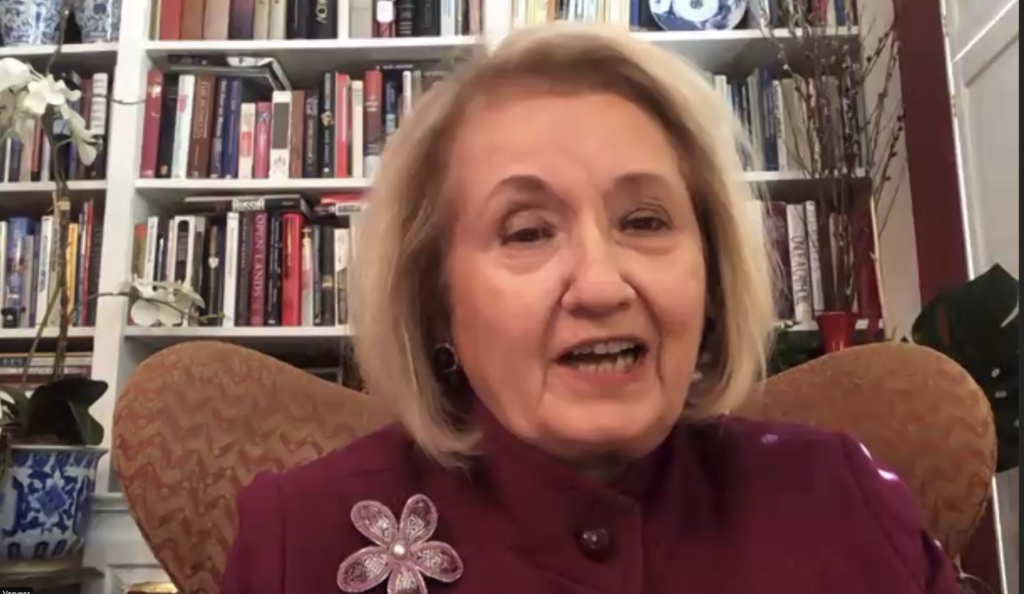
Ambassador Melanne Verveer, Executive Director of GIWPS
Ambassador Melanne Verveer, Executive Director of GIWPS and Eamon Ryan, Minister for the Environment, Climate and Communications of Ireland set the context for this topic to an audience of 1000, by saying “as I think we all know, climate change is the existential threat of our time”. Extreme and severe, its presence, it was explained, is a security issue, with floods, droughts, water scarcity, the loss of arable land, and livelihoods, leading to growing competition for resources, worsening instability, and conflict. The escalating call to pay greater attention to the gender dimensions of the climate crisis was emphasised -women and children not only as those most vulnerable to the impact, but crucially, as essential to the adaptation, mitigation and finding of future solutions. Ambassador Verveer shared the latest report from GIWPS on the climate gender conflict nexus, a report that includes an exploration of the linkages between climate change and conflict, and gender as a cross-cutting lens.
Stepping in for Ambassador Geraldine Byrne Nason, John Gilroy, a First Secretary at the Irish Mission and a member of the team who co-facilitated the negotiations of the 2030 Agenda and the SDGs, highlighted the importance of combining discussions on women, climate, peace and security. While some states challenge some topics, like climate, being seen through a security lens, that doesn’t correspond to reality. As Gilroy said, “women all over the world aren’t waiting for permission to act, they are already in action, doing the work and pushing for change, we must join with and support them”. He acknowledged the work of event organisers including Soroptimist International, and said of CSW, “It is a time for all to come together in solidarity, to share best practice, and learn from each other.”
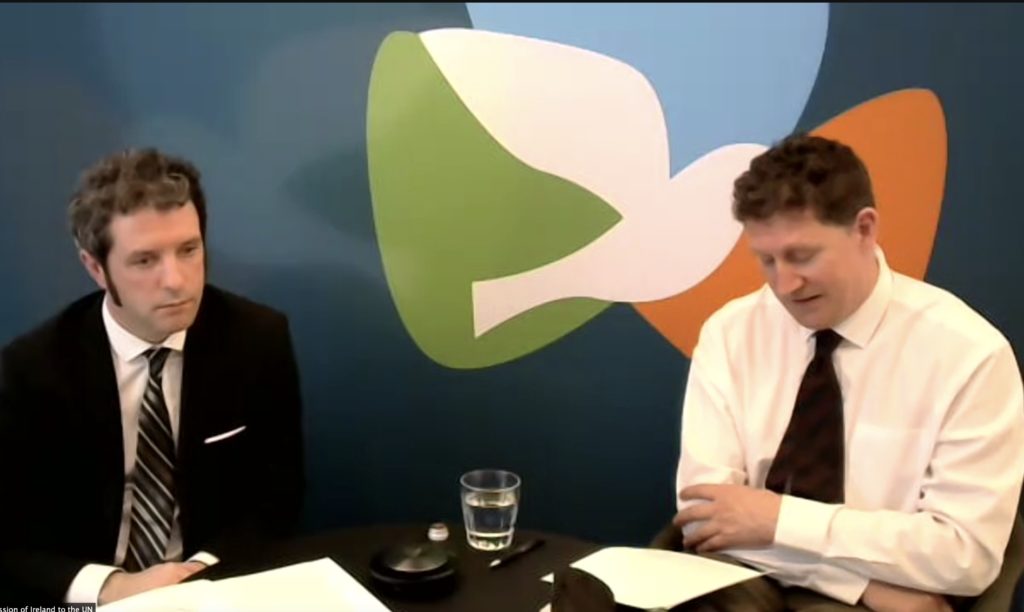
Eamon Ryan, Minister for the Environment, Climate and Communications of Ireland (left) John Gilroy (right) a First Secretary at the Irish Mission
The project ‘Culture of Peace’ that Sophia presented showed just this. This project, which SI had shared through its 2021 Report for the High-Level Political Forum which reviews the implementation of the SDGs, uses the universal challenge of climate change to bring communities together after election-based tribal violence. Sophia explained:
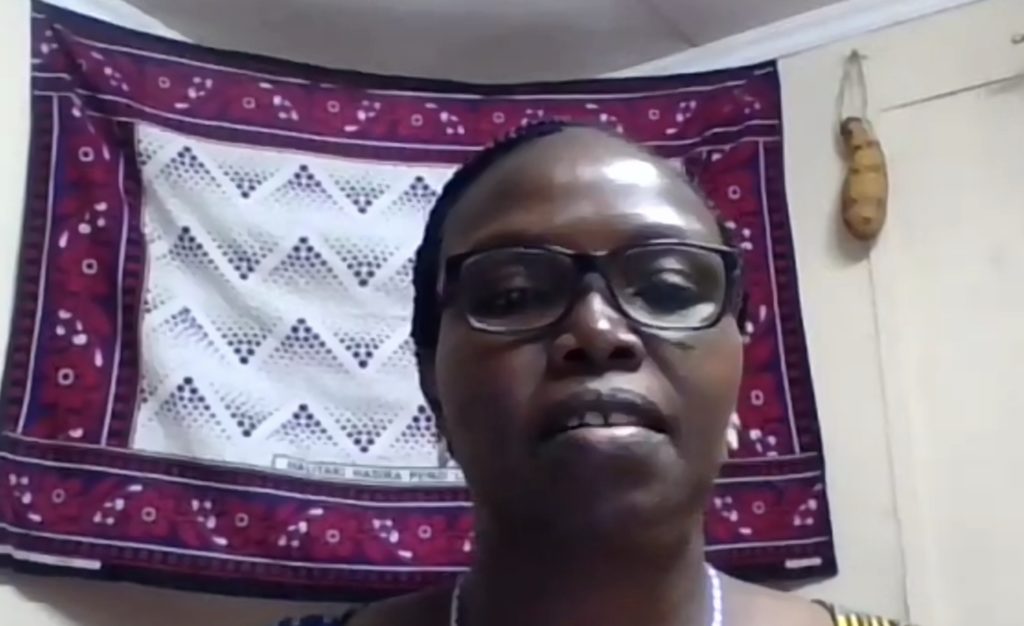
Sophia Kipkoech, member of SI Eldoret
“During each election cycle Eldoret experiences a lot of election violence – in 2007, we saw over 100 women displaced. Environmental challenges affect everyone no matter which tribe you’re from. It provides an opportunity to unite a divided community, we assisted the communities who were fighting during the elections. During the election we had to provide counselling in the camps, and then after counselling we worked with women to plant trees and in turn, they get solar lanterns, a rain water tanks and solar cookers. We work on clean production too, including reusing water. In doing this we bring communities to find solutions as a team, regardless of which tribe or community you come from … The trees impact desertification and absorb carbon, but we also reduce kerosine intake through clean cookers and solar lights. This helps eliminate indoor pollution.”
You can read more about this project on pages 27-29 in SI’s Report ‘Confronting Inequalities: Achieving the Sustainable Development Goals during the Covid-19 Pandemic’.
Reflecting upon the work of the Culture of Peace project, for Sophia it is clear that projects and programmes must work with women organisations but also that they empower the women who participate in the project. They cannot only be “recipients” of support, women must be empowered as agents of change. For that to happen, more funding and resources need to be directed towards the kinds of projects the panel presented. Governments and international organisations do not always need to create a new project, they can more effective by supporting and partnering with projects already in action.
Sophia’s recommendations mirrored that of other speakers, demonstrating the universality of what must happen to better address the intersection of climate change and conflict. Mary Robinson highlighted the relevance of the topic of gender responsive climate action, and the role of women and girls as agents of change in climate related conflict, saying “they are often invisible, under resourced, and under thought about” and “that has to change”. She reflected on times when participation and presence was “too male and too pale and too stale”; emphasising the value of women being at the table and their involvement in climate discussions. She mentioned Constance Okollet, Uganda and others; those women on the frontline and the first-hand experiences and stories they share in the context of both climate and conflict, saying “that’s a story that we need to hear far more about”.
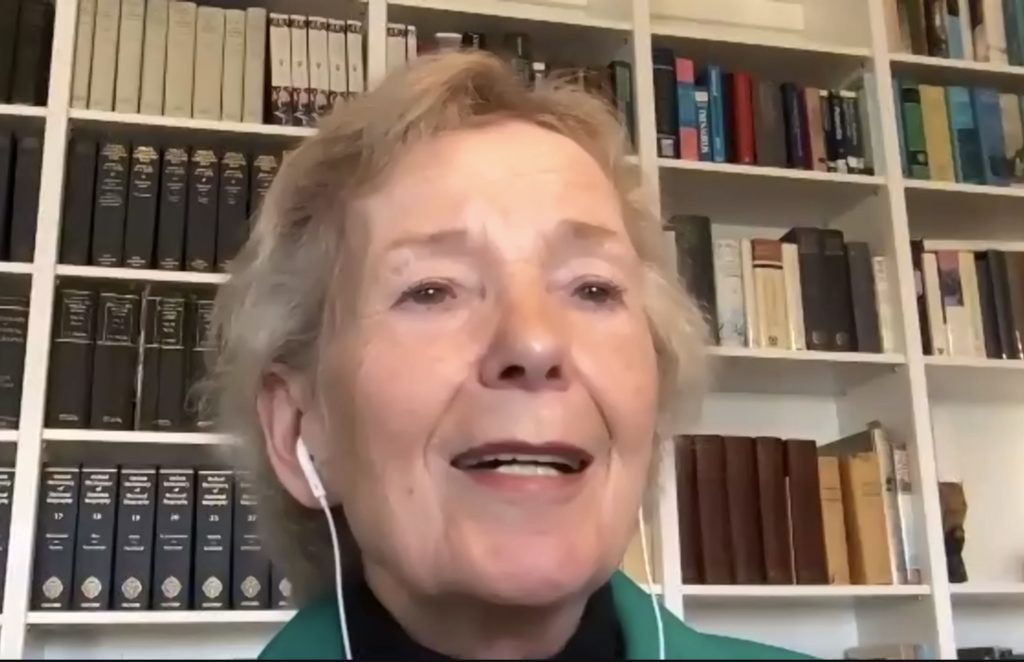
Mary Robinson, Chair of the Elders, Former President of Ireland
Robinson also referenced the lack of available data – the need for more, asking what needs to happen next? She said gender equality needs to be placed full and centre to tackle the problems of conflict and climate. Resources are a requisite, and that there is inadequate finance directed to women’s groups. She noted the tendency for big businesses to finance big projects but not the smaller women-led initiatives, adding that funding would make women more visible, and that instead of attempting to fit them into pre-determined agendas, they must fund projects that they want to do. “The amount of climate financing direct to women is about 1.5%. The amount which gets to women on the ground is 0.2%”, Robinson explained.
On the Intergovernmental Panel on climate change and the report released earlier this year, she said “it is a truly frightening report” detailing the impact of climate change around the world, and the severe impacts on the poorest countries and communities, saying “we are reaching tipping points” and “we are not on course for a safe world”.
She closed by asking that we recognise women and girls as agents for change, adding “if we would make them more visible, they would be more powerful”.
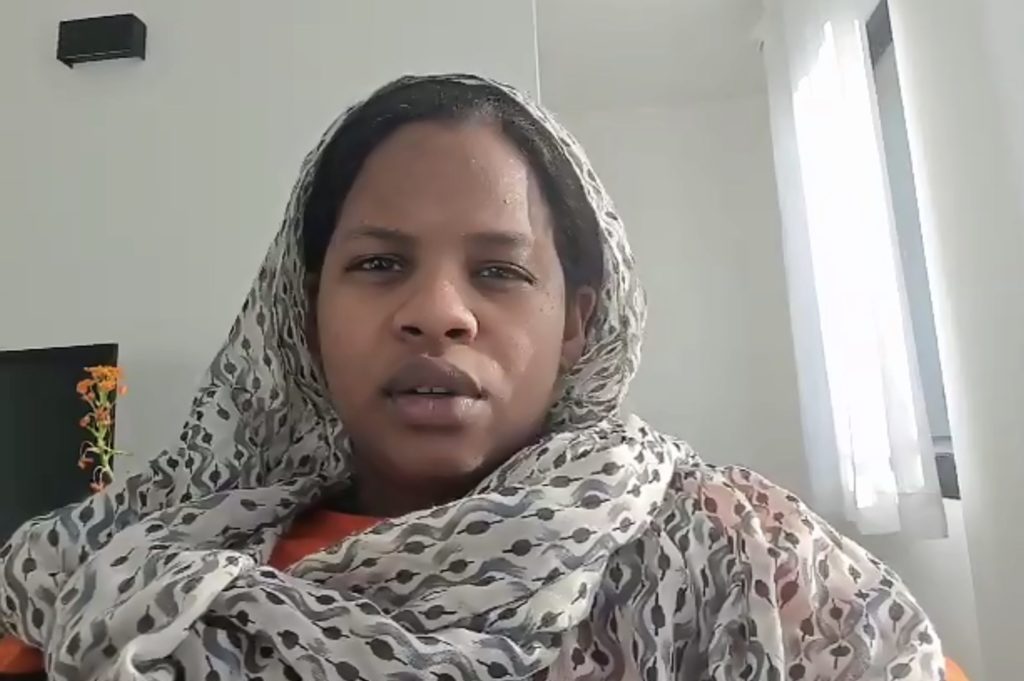
Nisreen Elsaim, Chair of the UN Secretary-General’s Youth Advisory Group on Climate Change
Similar messages were heard from Nazreen Al Sahim, Chair of the UNSG youth advisory group on climate change and Horia Faizi Sardarzada, Director-General of Early Childhood Care and Education ECCE/Kindergartens, Ministry of Labor and Social Affairs in Afghanistan. Both of these grassroots speakers emphasised how women work hand-in-hand with communities and that scarce resources are driving conflict. Al Sahim reframed how we can consider women peacebuilders saying “Women who work in climate advocacy, I don’t think are peace builders, they are conflict preventers … The question is how do we help these women, how they can have early warning systems, and how they can be financed.” Faizi Sardarzada emphasised the need to go beyond research recommendations and to focus on implementation, saying that five things need to happen to change how work combating climate change and conflict is done.
“First, existing policies and strategies need to be climate & gender responsive.”, Faizi Sardarzada outlined, “Second, women need to be included at the local level to be change leaders. Third, wealthy countries, who are more responsible for climate change, to just meet their commitments that they’ve made. Fourth, think of countries affected by CC – developing and lower income countries, and to have specific programmes designed for those countries. This should include preparedness, humanitarian solutions and development solutions. Fifth, they need to consider all of this in a feminist way – gender must be centred.”
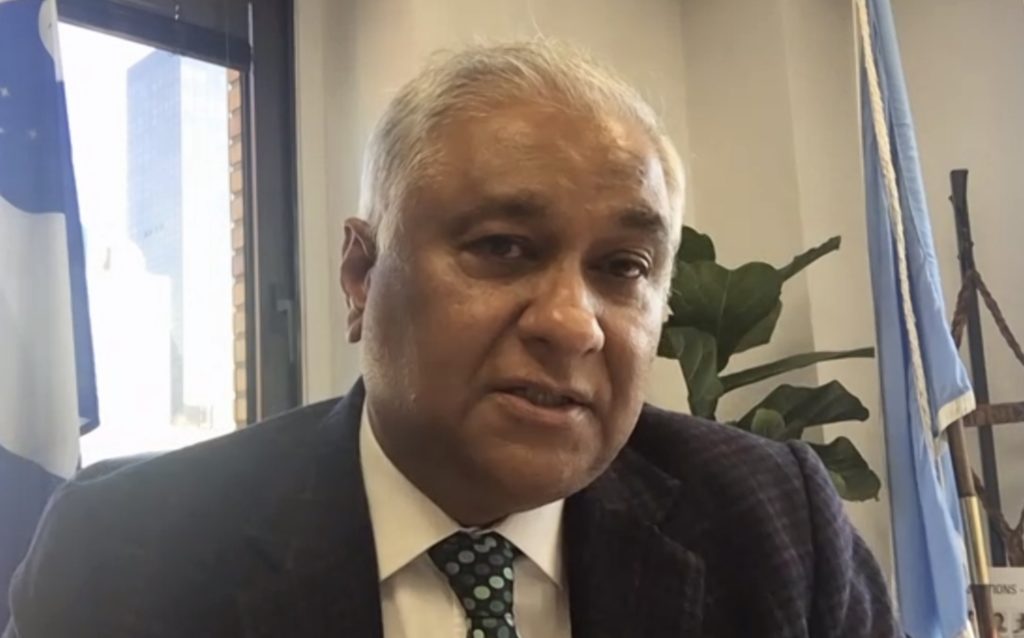
Ambassador Satyendra Prasad, Permanent Representative of Fiji to the United Nations
Ambassador Satyendra Prasad, Permanent Representative of Fiji to the United Nations spoke of how climate and security impacts and aggravates every inequality, including gender inequality. And that “every phenomena that is an element of the climate and security nexus impacts upon men and women differently”. The experience of flood between men and women, girls and boys is felt differently; food Insecurity and access to help and displacement, are all felt differently.
He reiterated that women can indeed be found on the frontlines of climate change, but also on the backlines of climate change, saying that when the men leave, it is women who are the last ones standing.

Horia Faizi Sardarzada, Director-General of Early Childhood Care and Education ECCE/Kindergartens, Ministry of Labour and Social Affairs in Afghanistan
With the power of all the speakers’ recommendations still fresh, Ambassador Verveer closed the event emphasising the value of practical action and financing. She hoped that the audience would take away not only the importance of listening to the expertise of women and girls, but also the importance of creating mechanisms which capitalise on that expertise. New and existing funding streams must finance projects that place gender equality, climate and security at their heart.

